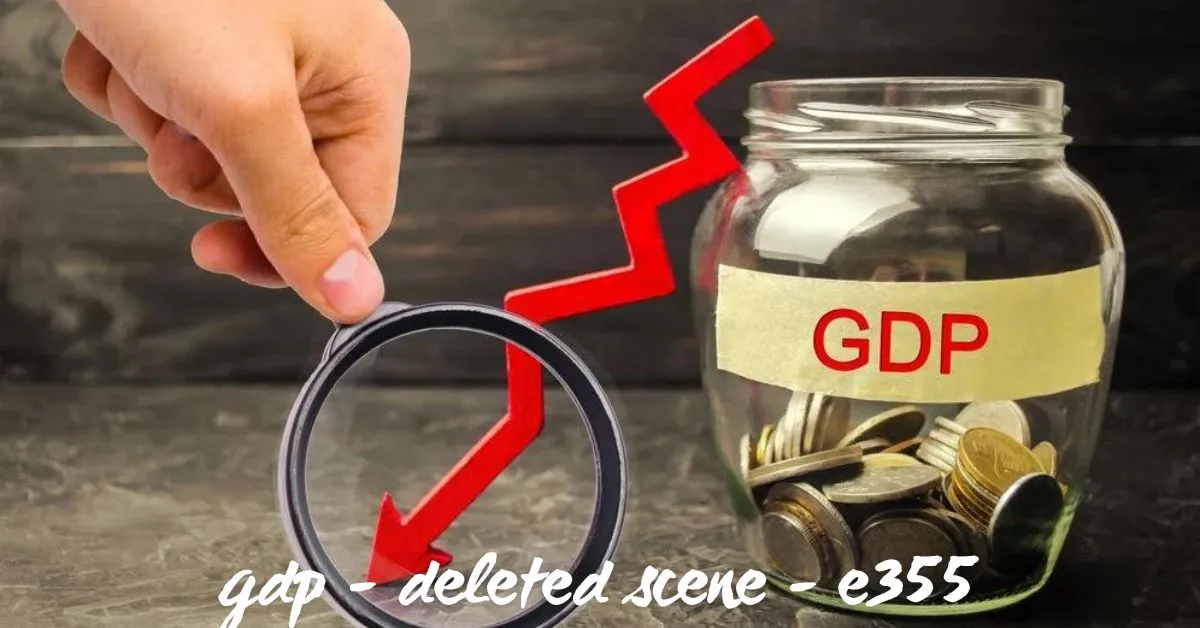When we think about economic health, one of the first things that come to mind is GDP (Gross Domestic Product). It’s the star of the show, the main character in the story of a nation’s economic performance. But what if I told you there’s more to this story—deleted scenes, if you will, that never made it into the final cut? Enter the concept of “GDP – Deleted Scene – E355,” a metaphorical exploration of the pieces of the economic puzzle that GDP doesn’t capture. This article dives deep into the complexities of GDP, the missing pieces, and the need for alternative measurements, while also touching on the cultural impact, fan theories, and the intriguing role of deleted scenes in enhancing our understanding.
Understanding GDP – Deleted Scene – E355 : The Basics
To grasp the significance of the ‘GDP – deleted scene – e355,’ we first need to understand the basics of GDP. Gross Domestic Product is a monetary measure of the market value of all final goods and services produced in a country during a specific period. It’s the go-to indicator for economists and policymakers to gauge economic performance and make comparisons between different nations or time periods.
The concept of GDP dates back to the 17th century but gained prominence during the 20th century, especially after the Great Depression and World War II. It became the central measure of economic progress, serving as a benchmark for economic health. However, while GDP is incredibly useful, it’s not without its limitations.
The Missing Pieces: What GDP Doesn’t Capture
Despite its widespread use, GDP is far from a perfect measure. It’s like watching a movie but only getting the highlights—missing out on the subplots, character development, and the nuances that make the story truly compelling. Let’s explore some of the critical aspects that GDP fails to capture.
See also: Exploring MyFastBroker Trading Apps : The Ultimate Tool for Traders
Environmental Impact and Sustainability
One of the most significant shortcomings of GDP is its inability to account for environmental degradation. A country could be experiencing rapid GDP growth while simultaneously depleting its natural resources, leading to long-term unsustainability. Think of it as the deleted scene where the protagonist’s reckless actions come back to haunt them—something GDP doesn’t show us.
Social Well-being and Inequality
GDP measures economic output but doesn’t say anything about how that wealth is distributed among the population. It’s possible for GDP to be growing while inequality worsens, with the benefits of economic growth accruing to a small elite. This is another deleted scene, where the supporting characters’ stories are overlooked in favor of the main plot.
The Informal Economy and Unpaid Work
GDP also ignores the informal economy and unpaid work, such as caregiving and household chores, which are crucial to societal functioning. These activities might not generate direct monetary value, but they’re essential to the economy’s overall health—a vital subplot left on the cutting room floor.
The Concept of ‘GDP – Deleted Scene – E355’
So, what exactly is ‘GDP – Deleted Scene – E355’? This concept is a metaphorical way of describing the elements that GDP overlooks—the ‘scenes’ that didn’t make it into the final narrative of economic performance. These deleted scenes are the hidden dimensions of the economy that, when pieced together, provide a more comprehensive and accurate picture of a nation’s true economic health.
Why These ‘Scenes’ Matter
These missing pieces are not just trivial details; they are crucial to understanding the full economic story. Without considering environmental sustainability, social well-being, and the informal economy, we risk making policies based on an incomplete understanding of the economy. It’s like judging a movie based on a few selected scenes without seeing the entire film.
Examples of GDP – Deleted Scene – E355 Analysis
Consider a country experiencing rapid industrialization. GDP might show impressive growth, but what about the environmental damage, the widening inequality, or the exploitation of informal workers? These are the deleted scenes—important aspects that GDP doesn’t capture but are vital for understanding the full story.
The Need for Alternative Measurements
Given the limitations of GDP, there’s a growing consensus that we need alternative measurements to get a more holistic view of economic health. Several alternatives have been proposed, each aiming to capture different aspects of what GDP misses.
Overview of Alternative Economic Indicators
Some popular alternatives include the Genuine Progress Indicator (GPI), which accounts for environmental and social factors, and the Human Development Index (HDI), which measures health, education, and income. These indicators provide a more nuanced view of economic progress, considering factors that contribute to long-term well-being and sustainability.
How These Indicators Offer a Holistic View
Unlike GDP, which focuses purely on economic output, these alternative measurements consider a broader range of factors, including environmental sustainability, social equity, and quality of life. By including these elements, they offer a more comprehensive and accurate picture of a nation’s overall health.
Case Studies Showcasing Alternative Measurements
For instance, Bhutan’s Gross National Happiness (GNH) index prioritizes well-being over economic output, leading to policies that focus on sustainability, cultural preservation, and social welfare. Similarly, New Zealand’s Wellbeing Budget emphasizes health, education, and environmental protection, moving beyond GDP as the sole measure of success.
Cultural Impact of GDP – Deleted Scene – E355
GDP isn’t just an economic measure; it’s also a cultural force that shapes how we perceive success and progress. The focus on GDP can lead to a narrow view of prosperity, where economic growth is prioritized at the expense of other important factors.
Influence on Public Policy and Social Norms
Governments often design policies to boost GDP, sometimes at the cost of social and environmental well-being. This can lead to a culture where economic growth is valued above all else, reinforcing the narrative that GDP is the ultimate measure of success.
Role of Media in Perpetuating the GDP Narrative
The media plays a significant role in reinforcing the importance of GDP. Headlines about GDP growth or decline can drive public perception, influencing how people think about their country’s economic health. This focus on GDP can overshadow other important issues, much like how deleted scenes in a film might contain crucial information that changes the viewer’s understanding of the story.
Fan Theories and GDP: A Creative Take
Just as fans of movies and TV shows create theories about deleted scenes, some economists and thinkers have developed creative interpretations of GDP and its limitations. These ‘fan theories’ offer alternative ways of thinking about economic performance, challenging the conventional wisdom.
Exploring Fan Theories Surrounding GDP
Some fan theories suggest that focusing on GDP alone is like watching a movie in black and white when there’s a full-color version available. These theories propose alternative narratives that include the deleted scenes, offering a more vibrant and complete picture of the economy.
How Creative Interpretations Can Lead to New Insights
By thinking creatively about what GDP misses, we can develop new insights into how economies function and what truly matters for societal well-being. These interpretations can inspire innovative approaches to economic policy, much like how fan theories can lead to new ways of understanding a beloved film or show.
Role of Social Media and Online Communities
Online communities and social media platforms have become spaces where these alternative ideas about GDP are discussed and debated. Just as fans share and critique deleted scenes from their favorite shows, people are increasingly questioning the dominance of GDP as the primary measure of economic success.
Deleted Scenes in Media: A Parallel to GDP – Deleted Scene – E355
The concept of deleted scenes in movies and TV shows offers a useful parallel to the limitations of GDP. In media, deleted scenes often provide additional context, character development, or plot details that enhance the overall narrative. Similarly, the ‘deleted scenes’ in GDP analysis—like environmental and social factors—can deepen our understanding of economic health.
Significance of Deleted Scenes in Movies and TV Shows
Deleted scenes are often seen as bonus content for fans, offering deeper insights into the story. They can reveal motivations, backstories, or alternative outcomes that weren’t included in the final cut, but that nonetheless enrich the viewing experience.
How Deleted Scenes Enhance Audience Engagement
For many viewers, deleted scenes are a way to engage more deeply with the content, offering a fuller understanding of the story. This parallels the idea that considering factors beyond GDP can lead to a more comprehensive understanding of economic performance.
Drawing Parallels Between Media and Economic GDP – Deleted Scene – E355
In the same way that cut scenes in movies provide a fuller image, ‘deleted scenes’ in economic research, which include topics like social equality and environmental sustainability, paint a more comprehensive picture of a country’s well-being. Disregarding these considerations is like seeing a film missing key sections, resulting in a partial comprehension.
The Role of GDP – Deleted Scene – E355in Enhancing Audience Engagement
Audiences love deleted scenes because they offer something extra—a deeper connection to the story and its characters. In the context of economics, the ‘deleted scenes’ that GDP misses are just as crucial for understanding the full picture.
Why Audiences Crave GDP – Deleted Scene – E355
Deleted scenes often contain the nuances and details that make a story richer and more engaging. They offer viewers a chance to see the story from a different perspective, much like how alternative economic indicators can provide a more well-rounded view of economic health.
The Psychological Impact of Understanding the ‘Full Story’
There’s a psychological satisfaction that comes from knowing the full story. In economics, this means considering all aspects of a nation’s health, not just those captured by GDP. By including the ‘deleted scenes,’ we can create policies that better reflect the true state of the economy.
Parallels to the Need for Alternative Economic Measurements
Just as deleted scenes can change our perception of a film, alternative economic measurements can shift our understanding of what constitutes success and progress. By looking beyond GDP, we can develop a more inclusive and accurate narrative of economic health.
The Case for Rethinking GDP – Deleted Scene – E355
Given the limitations of GDP and the importance of the ‘deleted scenes,’ it’s clear that we need to rethink how we measure economic success. GDP has served us well, but it’s time to update our approach to reflect the complexities of the modern world.
Arguments for Re-evaluating GDP – Deleted Scene – E355
The complete narrative isn’t captured by GDP alone because it focuses on economic production. We may improve our knowledge of economic health to incorporate environmental sustainability, social well-being, and other important elements by re-evaluating GDP and using other metrics.
Impact of Embracing Alternative Measurements
Better policymaking, with an emphasis on sustainability and well-being over short-term economic development, may result from adopting alternative assessments. Concerns about social cohesiveness, inequality, and climate change may be significantly impacted by this transformation.
Future of Economic Storytelling and GDP – Deleted Scene – E355
The future of economic storytelling lies in acknowledging and incorporating the ‘deleted scenes.’ By doing so, we can create a more comprehensive and accurate narrative that reflects the true state of the world. This approach will not only enhance our understanding of the economy but also lead to more informed and effective policies.
Conclusion
The concept of ‘GDP – Deleted Scene – E355’ highlights the limitations of relying solely on GDP to measure economic success. Just as deleted scenes in a movie can change our understanding of the story, the ‘deleted scenes’ in economic analysis—like environmental and social factors—are crucial for understanding the full picture. By embracing alternative measurements and rethinking our approach to economic health, we can create a more accurate and comprehensive narrative that better reflects the complexities of the modern world.





One thought on “The Hidden Side of GDP – Deleted Scene – E355”